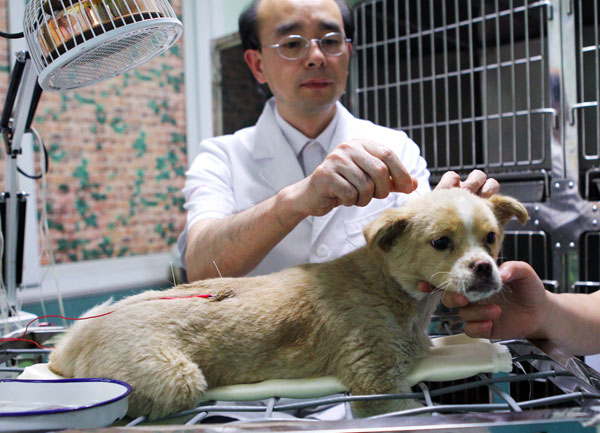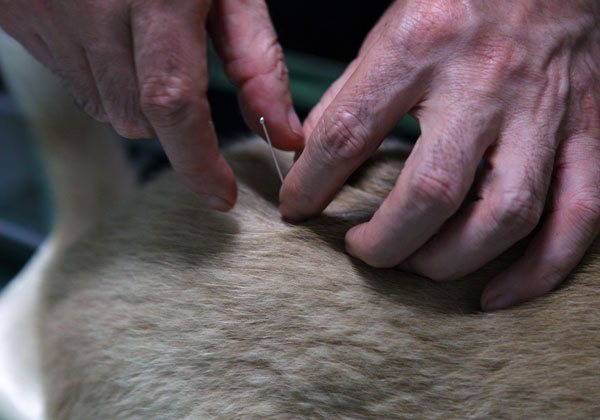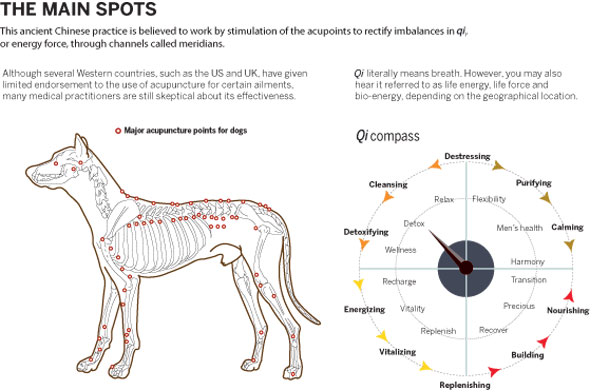Acupuncture provides new hope for injured pets, Shi Yingying reports in Beijing.
When an injured Red-footed Falcon was brought into the Raptor Rescue Center at the Beijing International Fund for Animal Welfare three years ago, the dove-sized creature couldn't stand or hold onto branches with its talons. When the bird was diagnosed with a paralyzed left claw, almost all the veterinarians who specialized in Western medicine shook their heads and concluded that there was no suitable treatment.
"The functions of a raptor's talons are beyond people's imagination - without them, it couldn't support itself because it wouldn't be able to compete for food with other birds of prey," said Li Ying, a vet and a member of the center.
"It simply wouldn't survive in the wild, which is our ultimate goal," Li said.
In terms of treatment, Li took a different view to her colleagues, and a few needles and herbal treatment saved the bird's life. Li took the falcon to her alma mater, Beijing University of Agriculture, three times a week over a three-month period. There, during a typical 20-minute session, Li's teacher Chen Wu, who is also the deputy secretary-general of the Traditional Chinese Veterinary Medicine Society, inserted needles into four acupuncture points on the raptor's left talon.
|
 |
| Chen Wu, a professor with Beijing University of Agriculture, treats a dog with acupuncture in Beijing last month. Zou Hong / China Daily |
"It reacted the first time we connected it to the electric acupuncture machine. The bird's left claw made grabbing movements," Li said.
After the session, the falcon underwent physical rehabilitation treatment every second day, standing in water heated to 45 C and mixed with extract of saffron, a traditional herbal remedy known to invigorate the circulatory system. By the end of three months, the falcon was brimming with energy and was returned to the wild in 2010.
Elsewhere in Beijing, veterinarians are hooking dogs and cats to electric acupuncture machines, treating them with homeopathic remedies, feeding them traditional Chinese herbal medicines and even spraying herbs such as lavender, lemon and eucalyptus in the name of aromatherapy. Traditional Chinese medicine is back in fashion, but this time, it's focused on the pet industry.
Try needles
"To be honest with you, I'd never even seen a falcon before treating that one," said Chen, who is also vice-dean of the university's College of Veterinary Medicine and Animal Science. "But I know exactly where a chicken's acupuncture points are. When it comes to birds, the locations of their acupoints are all much the same."
|
 |
| A dog undergoing acupuncture at the Beijing Companion Animal Hospital. Traditional Chinese medicine is back in fashion, not only for people but also for pets. Veterinarians are now connecting animals to electric acupuncture machines, treating them with homeopathic remedies and even feeding them herbal TCMs. Zou Hong / China Daily |
According to Chen, dogs and cats aren't the only beneficiaries and the traditional skill can also be used to treat horses, cows, rabbits and even guinea pigs. "It has commercial uses as well. Did you know that in Japan, people use acupuncture on fish to save the huge costs of refrigerating sashimi?" said Chen, explaining that acupuncture can induce sleep in fish, so that the expense of keeping raw fish in cold storage is no longer necessary.
However, not everyone is convinced that the treatment is beneficial.
Li Mo, a medical affairs commissioner from the biomedical researcher Shanghai Huayi Bio Lab, who majored in veterinary studies and studied both Western and Chinese medicine, said it will be a long time before animal acupuncture is accepted in China.
"First of all, it's a demanding skill - how many experienced acupuncturists can you find in China for people, let alone animals, so there's a lack of talent," he said. "Even if we find enough people willing and able to do it, mainstream pet hospitals couldn't accept it: How many hospitals specializing in animal acupuncture can you find in Shanghai? None, the only ones available are based in Beijing," he said.
Li argued that the high treatment costs - 300 yuan ($47) per session, according to Chen Wu - means that the therapy is limited to pets rather than other domesticated animals such as chickens and ducks.
Meanwhile, the Colorado-based American Academy of Veterinary Acupuncture in Hygiene, has said that acupuncture is limited to the treatment of aliments ranging from hip dysplasia and chronic degenerative joint disease to respiratory, gastrointestinal, neurological and urinary tract disorders.
Chen Wu doesn't agree. "It can manage almost anything, because the underlying philosophy is that acupuncture mobilizes the animal's bodily functions. Inserting a needle at the correct acupuncture point can maximize your pet's potential. That's what I love about this method - the magic is there in this simple, tiny needle, which can cure so many diseases," he said.
Of course, acupuncture has its limitations," he added. "When an animal has already lost control of its bodily functions, in cases such as massive bleeding for example, acupuncture can't help."
The researchers understand relatively little about how and why this alternative therapy works, but Chen said his practical experience is the best proof. "Out of the thousands of paralyzed animals I have helped, more than 90 percent reacted in the first two weeks of the treatment," he said.
One of those animals is Jiao Jiao, a 12-year-old Pekingese. Two years ago, Jiao Jiao's owner, Wu Jianhua, was desperate. Her beloved dog was paralyzed from the neck down after becoming stranded in a spring snowfall in Beijing. "Jiao Jiao has had bad lumbar vertebra since she was a puppy, but when I found her in the snow, she couldn't stand, eat or drink, and she had become incontinent," said Wu. "We tried conventional injections and infusions, but she just got worse. Jiao Jiao would lie awake at night, crying and drooling. She could not swallow and started to suffer from progressive muscle wastage."
Just when Wu began to consider putting the animal to sleep, a vet recommended acupuncture. "I figured it was worth a shot," she said. As it turned out, it was worth many shots. Twice a week, Jiao Jiao sits quietly on a special hammock-shaped table - so that the animal can't make any sudden movements when the needles are inserted - as Chen Wu sticks a series of 0.2-millimeter-thick needles along the length of her spine and across her shoulders, haunches and forelegs at a depth of 2 centimeters.
Although the treatment is expensive it has produced rapid results. By the second week, Jiao Jiao was able to stand up. "I don't think I would have her today if not for acupuncture," admitted Wu. "I would have had her put to sleep two years ago because I couldn't stand her being in such pain."
|
 |
The trump card
Around a dozen pet hospitals in Beijing offer acupuncture, making the city the Chinese center of animal acupuncture, mainly thanks to the efforts of Liu Lang. Liu, president of the Beijing Small Animal Veterinary Association and owner of the Companion Animal Hospitals chain, established acupuncture departments in his hospitals several years ago.
"My motivation was very simple at the beginning - the pet health industry on the mainland started relatively late, and we're about 50 years behind the US, 40 years behind Europe and 20 years behind Japan. We have to consider what we have been good at during that time frame," said Liu. "Acupuncture is our trump card, because it originated in China."
According to Liu, the application of acupuncture and traditional Chinese herbal treatment for animals is not limited to urban areas. "Rural vets have always used these methods to save livestock, because they didn't know about Western medicine years ago."
However, the situation changed after the introduction of Western veterinary medicine. "Nowadays, people think a Western pill is more effective than Chinese herbal treatments and that injections work more quickly than acupuncture, but they don't even consider the side effects, such as food safety," said Liu. "The more drugs you use, the greater the residue left in the animal."
Moreover, in contrast to the "barefoot vets", who are rarely well-educated and treat animals according to experience and with medicines whose recipes have been handed down for generations, the vets practicing animal acupuncture in Hong Kong and Taiwan have certificates from countries such as the US and the UK.
One of them, Doctor Patricia Shuen, who runs an animal hospital called Pet Cares in Hong Kong, finished an acupuncture course in Australia five years ago. "My pet hospital is a member of the International Veterinary Acupuncture Society, which is an American society established in the early 1970s," she said, adding that her course of study in Australia was based purely on traditional Chinese medicine for animals, but undertaken by doctors who were trained in the West.
"Clients ask for it every day," said Shuen. "They are the number one reason why we provide alternative therapies, because they all want something more than just drugs or surgery."
Contact the reporter at shiyingying@chinadaily.com.cn
